

Des milliards d'abeilles meurent pour notre lait d'amande. Renforçons la législation pour réduire l'exposition des abeilles à TOUS les pesticides ! Ariège: Après avoir perdu deux millions d’abeilles à cause d’un épandage, il se mobilise contre les phytosanitaires. Fin avril, le groupement d’apiculteurs de Haute-Garonne, Natur Miel, a perdu 24 ruches à cause de l’épandage d’un fongicide en Ariège.

Depuis les résultats d’une expertise prouvant l’intoxication de leurs abeilles, les apiculteurs ont lancé une campagne contre l’utilisation de produits phytosanitaires. Les abeilles victimes des téléphones portables? Il y aurait bien une incompatibilité d’antennes entre les abeilles et les réseaux de téléphonie mobile.
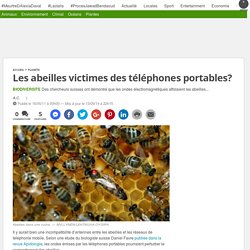
Selon une étude du biologiste suisse Daniel Favre publiée dans la revue Apidologie, les ondes émises par les téléphones portables pourraient perturber le comportement des abeilles. En plaçant deux téléphones sous une ruche, Daniel Favre a observé que les communications influaient sur les bruits émis par les abeilles. Vingt à quarante minutes après la mise en marche des téléphones, les insectes ont commencé à émettre des sons aigus, comme pour appeler à la fuite. A l’inverse, les abeilles sont redevenues calmes seulement deux minutes après que les chercheurs aient éteint les portables. Pas de lien prouvé entre ondes et mort des abeilles Même si les abeilles n’ont pas fui la ruche-test, Daniel Faivre pense que les ondes électromagnétiques pourraient avoir «de graves conséquences sur la disparition des colonies» d’insectes.
PÉTITION NATIONALE POUR LA SAUVEGARDE DES ABEILLES ET L’INTERDICTION DE TOUS LES PESTICIDES. Nous assistons à l’effondrement des écosystèmes et à l’extinction des abeilles en France et en Europe.
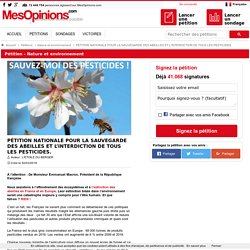
Stop Home Depot from downplaying bee-killing pesticides. Home Depot announced last year that it would require a label on plants grown with a family of pesticides that are worsening the bee die-off.

Yet despite scientific concerns, here is how their label describes the effects: This plant is protected from problematic aphids, white flies, beetles, mealy bugs, and other unwanted pests by Neonicotinoids. No mention whatsoever of the harmful impact on honeybees, butterflies, or other pollinators! Pesticides : quand les abeilles ont le bourdon … Les abeilles sont considérées comme les “reines de la biodiversité”.

Frelon asiatique. Like a Bee to the Clover. GMOs Are Killing the Bees, Butterflies, Birds and . . . ? Importante mortalité des abeilles: le cri d'alarme des apiculteurs ariégeois. C’est reparti non pas comme en 14 mais comme en 2009!
Et si les abeilles étaient aussi des lanceuses d'alerte ? ^^ – alwen

Plant STD linked to honeybee collapse. It’s time to have a little talk about the flowers and the bees.
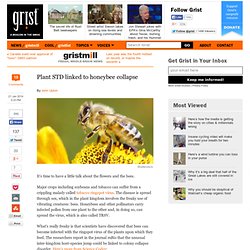
Major crops including soybeans and tobacco can suffer from a crippling malady called tobacco ringspot virus. ASH/FDA Workshop in Clinical Endpoints in Multiple Myeloma - ReportHoneyBeeHealth.pdf. Common crop pesticides kill honeybee larvae in the hive. UNIVERSITY PARK, Pa. -- Four pesticides commonly used on crops to kill insects and fungi also kill honeybee larvae within their hives, according to Penn State and University of Florida researchers.
Ces produits tueraient seulement les espèces "nocives". Bien sûr que non ! Enfin si ce genre d'études peut prouver UNE FOIS POUR TOUTE que diffuser des pesticides, fongicides, herbicides, enfin bref tous ces produits soit-disant "phyto-sanitaires" (alors que ce sont de purs et simples poisons !) est nocif pour la totalité des êtres vivants et doit être proscrite on aura gagné. Mais que le chemin est long ! – alwen
The team also found that N-methyl-2-pyrrolidone (NMP) -- an inert, or inactive, chemical commonly used as a pesticide additive -- is highly toxic to honeybee larvae.
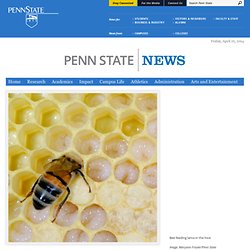
Les abeilles sacrifiées sur l'autel de l'agriculture intensive. Les colonies d'abeilles connaissent une surmortalité depuis 20 ans.

La tapisserie tout entière. Bees can’t find flowers because of your car. As a species, we are not doing right by bees.
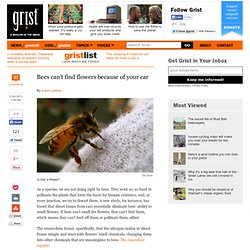
They work so, so hard to pollinate the plants that form the basis for human existence, and, at every junction, we try to thwart them. A new study, for instance, has found that diesel fumes from cars essentially eliminate bees’ ability to smell flowers. If bees can’t smell the flowers, they can’t find them, which means they can’t feed off them or pollinate them, either. Farm kills millions of bees with illegal pesticide spraying, gets slap on wrist.
A huge Florida citrus farm is being fined by state officials for poisoning millions of honeybees to death — but it’s not being fined very much. Ben Hill Griffin Inc., one of the state’s largest growers and a supplier to Florida’s Natural orange juice, is accused of illegally spraying pesticides (i.e., not following the directions on the labels) in ways that led to the deaths of bees kept by nearby beekeepers. One apiarist told officials that the farm used crop-dusters to douse its groves at least a dozen times — presumably to control Asian citrus psyllid, which spreads the devastating citrus greening disease. He estimated his losses at $240,000 worth of bees and reduced honey production. Another beekeeper says he is down $150,000. Scientists discover another cause of bee deaths, and it's really bad news. So what is with all the dying bees? Scientists have been trying to discover this for years.
Meanwhile, bees keep dropping like... well, you know. Is it mites? Pesticides? Cell phone towers? Quartz reports: The Mystery of Bee Colony Collapse. What's tipping honeybee populations into huge annual die-offs? For years, a growing body of evidence has pointed to a group of insecticides called neonicotinoids, widely used on corn, soy, and other US crops, as a possible cause of what has become known as colony collapse disorder (CCD).
Rather than kill bees directly like, say, Raid kills cockroaches, these pesticides are suspected of having what scientists call "sub-lethal effects"—that is, they make bees more vulnerable to other stressors, like poor nutrition and pathogens. In response to these concerns, the European Union recently suspended most use for two years; the US Environmental Protection Agency, by contrast, still allows them pending more study. E.U. bans another bee-killing insecticide. Antibiotiques et pesticides : un cocktail mortel pour les abeilles américaines - LeMonde.fr#xtor=EPR-32280229-[NL_Titresdujour]-20111106-[titres]#xtor=EPR-32280229-[NL_Titresdujour]-20111106-[titres]#xtor=EPR-32280229-[NL_Titresdujour]-20111106-[titres]
LE MONDE | • Mis à jour le | Par Martine Valo. Leruisseau - Antibiotiques et pesticides : un cocktail mortel pour les abeilles américaines. Publié par : LEMONDE - le 5 novembre 2011 article écrirt par Martine Valo Souvent qualifiée de "mystère", la surmortalité des abeilles domestiques, qui peut atteindre 90 % dans certaines colonies, mobilise un grand nombre de scientifiques. Common Pesticide Makes Honey Bees Picky Eaters. Heather Pilatic: Widely-Used Pesticides Killing Bees. Bees are still dying and EPA is still sitting on its hands. Luckily for those of us who like to eat, scientists have been hard at work cracking the "mystery" of colony collapse disorder (CCD). Today two new studies were published in Science, strengthening the case that neonicotinoid pesticides are indeed key drivers behind recent pollinator declines. To avoid in advance some of the inevitable confusion on this topic, nobody is saying that neonicotinoids are the culprit behind CCD.
Most scientists now believe that we have been losing more than a third of our hives each year since 2006 from a combination of factors acting in concert: pathogens, pesticides and nutritional stress. Sharp bee population decline 'linked to pesticides' Entomologists: “Stop feeding corn syrup to honeybees.” Duh. If you want to a kill a honeybee hive’s buzz, take all its honey away and feed the bees a steady diet of high-fructose corn syrup. Believe it or not, apiarists have been doing just that since the 1970s — feeding HFCS to their colonies as a replacement source of nourishment for the honey that gets taken away from them to be sold. And believe it or not, HFCS, which is bad for humans, is also bad for honeybees. It’s especially bad for those that are exposed to pesticides, which these days is a high proportion of them. It’s not that HFCS contributes to honeybee diabetes, nor does it result in honeybee obesity. But it weakens their defenses.
When honeybees collect nectar from flowers, they also gather pollen and a substance called propolis, which they use to make waxy honeycombs.